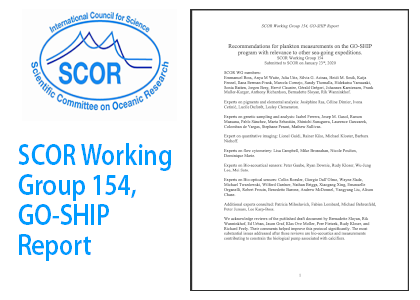The Technology is Here, the Time is Now: Expanding Biological Measurements on GO-SHIP
A new report from SCOR WG 154 (P-OBS)
 The oceanographic community has made great strides over the past couple of decades in developing physical and biogeochemical observing capacity. However, a more holistic understanding of marine ecosystem function and change requires large-scale and sustained ocean biological and ecological observations. The time for such an integrated approach has arrived. With new instruments, sensors, and analysis methods we now have the capacity to incorporate measurements of biological Essential Ocean Variables (EOVs) (e.g., biological standing stock, diversity, biological rates and fluxes) into existing observing programs and platforms. In particular, rapid advances in imaging, acoustics, and genomic sensing as applied to biological and ecological system functioning have made it feasible to incorporate these measurements into current sustained observing efforts such as the Global Ocean Ship-based Hydrographic Investigations Program (GO-SHIP) with a small impact on established operations. Broadening these global programs to include biological traits will fill critical knowledge gaps pertaining to marine ecosystem function and enhance our predictive capacity for more effective policy making and management of marine systems. A new report by the SCOR working group 154 (P-OBS) has just been released which outlines the measurement methods and the technologies available that have achieved a technology readiness level sufficient to be deployed world-wide as part of the GO-SHIP program. The co-deployments of these methods will provide an expanded view of the eco-system spanning from virus to fish, promoting the development of a more holistic understanding of marine ecosystems. While the GO-SHIP program is the focus of the report, adoption of the methodologies by other observing systems will provide for standardized methods from coastal to pelagic systems and across national boundaries.
The oceanographic community has made great strides over the past couple of decades in developing physical and biogeochemical observing capacity. However, a more holistic understanding of marine ecosystem function and change requires large-scale and sustained ocean biological and ecological observations. The time for such an integrated approach has arrived. With new instruments, sensors, and analysis methods we now have the capacity to incorporate measurements of biological Essential Ocean Variables (EOVs) (e.g., biological standing stock, diversity, biological rates and fluxes) into existing observing programs and platforms. In particular, rapid advances in imaging, acoustics, and genomic sensing as applied to biological and ecological system functioning have made it feasible to incorporate these measurements into current sustained observing efforts such as the Global Ocean Ship-based Hydrographic Investigations Program (GO-SHIP) with a small impact on established operations. Broadening these global programs to include biological traits will fill critical knowledge gaps pertaining to marine ecosystem function and enhance our predictive capacity for more effective policy making and management of marine systems. A new report by the SCOR working group 154 (P-OBS) has just been released which outlines the measurement methods and the technologies available that have achieved a technology readiness level sufficient to be deployed world-wide as part of the GO-SHIP program. The co-deployments of these methods will provide an expanded view of the eco-system spanning from virus to fish, promoting the development of a more holistic understanding of marine ecosystems. While the GO-SHIP program is the focus of the report, adoption of the methodologies by other observing systems will provide for standardized methods from coastal to pelagic systems and across national boundaries.
SCOR Working Group 154 (2020) Recommendations for plankton measurements on the GO-SHIP program with relevance to other sea-going expeditions. SCOR Working Group 154 GO-SHIP Report. Scientific Committee on Oceanic Research, 70pp. DOI: http://dx.doi.org/10.25607/OBP-718





